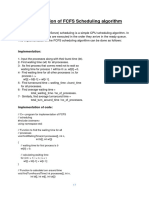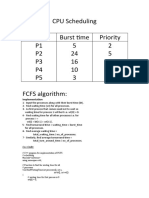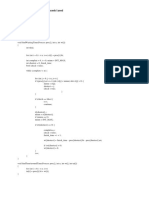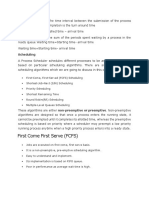0% found this document useful (0 votes)
24 views21 pagesOS Lab Manual: Scheduling Algorithms
This document contains a laboratory manual for an Operating Systems course. It includes 7 programs demonstrating different CPU scheduling algorithms like FCFS, SJF, Priority Scheduling, and creating child processes using fork(). For each program, the code is provided to implement the scheduling algorithm. The document also contains a certificate from the computer engineering department certifying the completion of the laboratory work.
Uploaded by
Krunal MakwanaCopyright
© © All Rights Reserved
We take content rights seriously. If you suspect this is your content, claim it here.
Available Formats
Download as PDF, TXT or read online on Scribd
0% found this document useful (0 votes)
24 views21 pagesOS Lab Manual: Scheduling Algorithms
This document contains a laboratory manual for an Operating Systems course. It includes 7 programs demonstrating different CPU scheduling algorithms like FCFS, SJF, Priority Scheduling, and creating child processes using fork(). For each program, the code is provided to implement the scheduling algorithm. The document also contains a certificate from the computer engineering department certifying the completion of the laboratory work.
Uploaded by
Krunal MakwanaCopyright
© © All Rights Reserved
We take content rights seriously. If you suspect this is your content, claim it here.
Available Formats
Download as PDF, TXT or read online on Scribd
/ 21




























































































